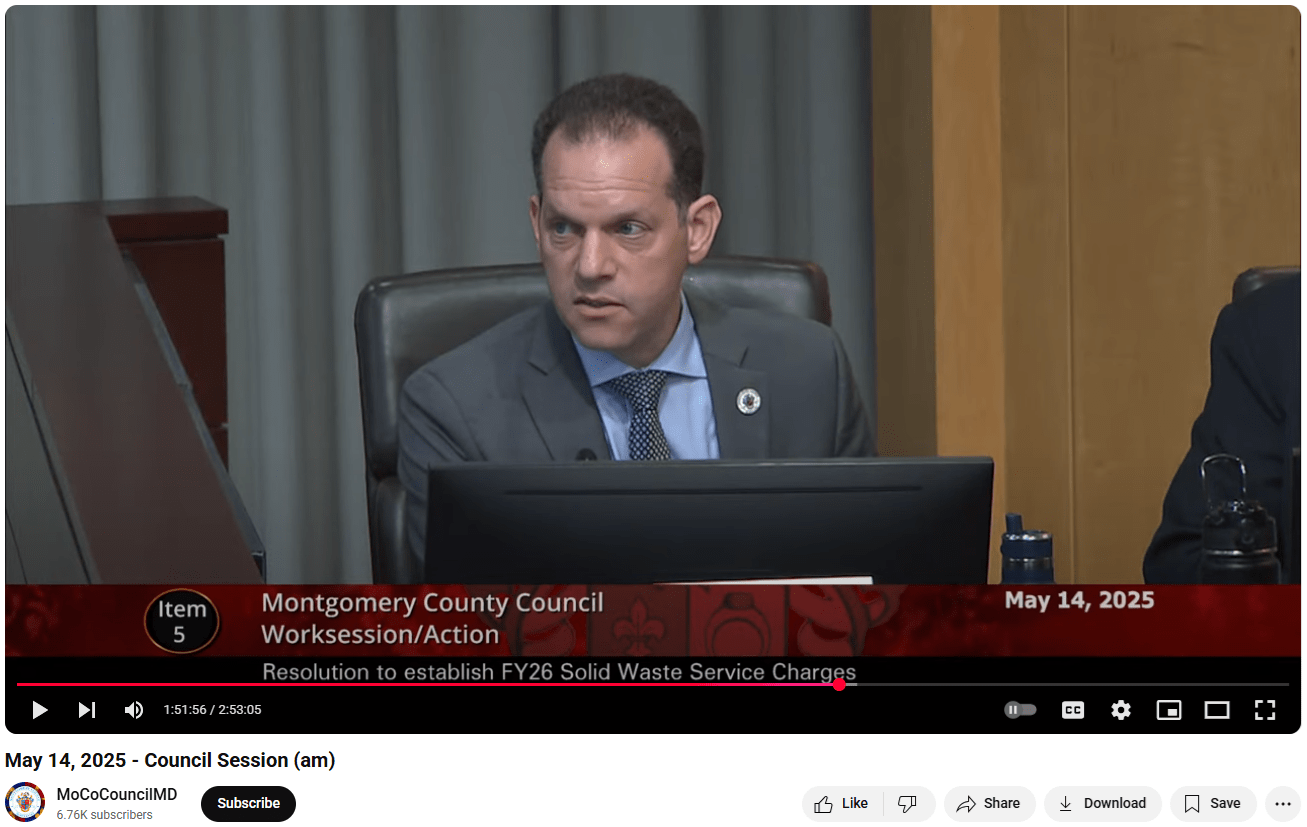By Adam Pagnucco.
Back in March, I reported that County Executive Marc Elrich had recommended a gigantic hike in the county’s systems benefit charge, which funds solid waste and recycling programs. The fee increase, amounting to 31% for single family homes and roughly double for multifamily and commercial properties, was intended to pay for a contract extension at the county’s Resource Recovery Facility (RRF) – its incinerator in Dickerson – and a new Material Recovery and Biological Treatment Facility that would replace it. This was intended to fulfill a campaign promise to close the incinerator that Elrich had made in 2018 – a promise that would now cost a huge chunk of money. Because the county council is empowered to set fees, the issue awaited its decision.
Last week, the council unanimously rendered its verdict: a big fee hike would replace Elrich’s gigantic fee hike. The single family home increase was trimmed from 31% to 25%. The multifamily increase was reduced from 105% to 56%. And the nonresidential increase was reduced from 105% to 73%. (Pick your appropriate synonyms for “big” and “gigantic” here.)
Why have a fee hike at all? Let’s remember how Elrich wanted to use the money. Part of it was supposed to pay for the above-referenced new Material Recovery and Biological Treatment Facility. According to its project description, the new facility would rely on “an advanced waste processing technology that uses mechanical separation systems to sort municipal solid waste into: 1. recoverable recyclable materials, 2. recoverable organic waste, and 3. residual waste for disposal elsewhere.” That project has two problems. First, its cost could be enormous given that the technology is new and it needs $36 million just for planning and design. Second, “residual waste for disposal elsewhere” means either a new landfill nearby or, more likely, trucking fees to move the waste out of the county. Can you see the dollar signs here? Wary of getting tied up in these commitments without more information, the council chose not to fund the capital project – for now.
Another piece – more money for the existing facility – was harder to avoid. The RRF (the Dickerson incinerator) is thirty years old. Incineration is not commonly understood to be a gentle process, so decades of it can lead to facility maintenance issues and a need for repairs. At a May 14 session of the council, Transportation & Environment (TE) Committee Chair Evan Glass explained the county’s predicament this way.
*****

Council Member Evan Glass.
There’s been a lot of consternation in the community about the increased fees that are associated with managing our waste. And the reason these fees are high is because our facilities have been neglected for the last number of years. There were no executive budget allocations over the last six years and when the executive signed a contract to continue the operation of the incinerator through April of 2031, there were fees associated with that. And the reality is that if these fees are not paid to the operator, our trash will not be collected. It is not a situation that any of us want to be in but it is an unfortunate situation nonetheless.
*****
Glass reinforced that point later in the discussion in a question to Jon Monger, Director of the county’s Department of Environmental Protection. Here is the exchange.
*****
Glass: On the first set of fees, which are maintaining services, Director Monger, as direct and succinct as you can, what happens if we do not fund those fees and approve them?
Monger: Well, first of all, thank you for the question council member and for all your ongoing work on this topic. We very much appreciate it. So I want to underscore that the amended recommended FY26 budget before you is focused on the projects that are limited to those necessary to maintain safe and reliable operation of the county’s MSW system. So that includes projects that are focused on compliance with all permits and environmental compliance. To answer your question, failure to complete the RRF repair and I’ll note that repairs of the transfer station in Derwood are also included in this budget request would risk the ability… essentially, the operator, our current waste system, and jeopardize the ability to fulfill a critical public service, raise severe human health and environmental risks and ultimately force the county to pursue options which would be more expensive.
Glass: So if we don’t approve the fees, we won’t be able to collect and dispose our trash. Is that what you just said?
Monger: In essence, yes.
*****
And so no one is happy. The council is unhappy because while a new environmental facility is theoretically attractive, the administration struggled to describe it and could not estimate its construction cost even in ballpark terms. Many environmentalists will be unhappy because the incinerator will continue operations, at least for now. Ratepayers will be unhappy to learn about their hulking new fees. And here is cause for further unhappiness:
This conversation will likely continue.
